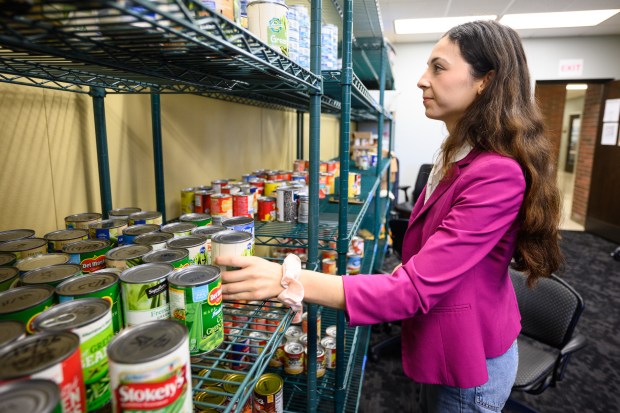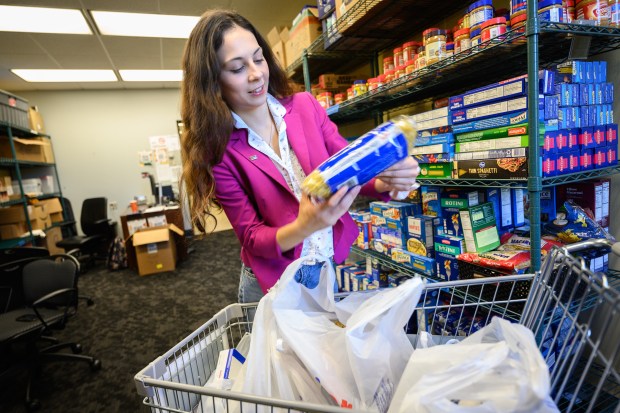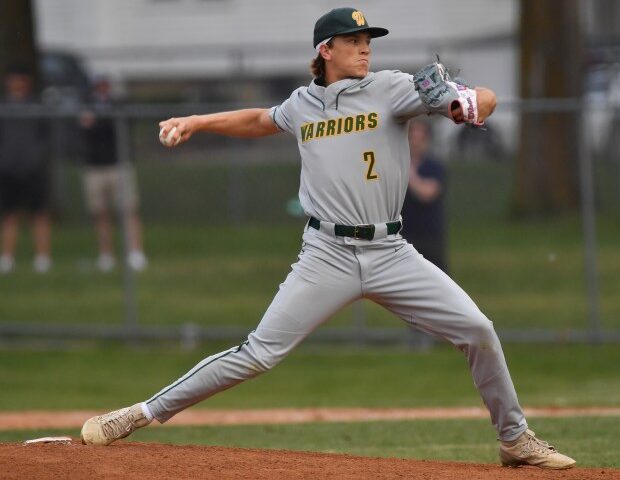Debbie Bachmann has worked at Purdue University Northwest for more than 20 years, but she’s met few students like Mya Bell.
“I can’t say enough about her,” said Bachmann, administrator of honors student leadership and programming at the university. “She’s just one of those students you’re never going to forget.”
Bachmann met Bell when she was a freshman admitted to the school’s Honors College. From the beginning, she saw that the student wanted to be involved with PNW’s food pantry.
Bell, a PNW senior majoring in political science and human development and family science, is president of the university’s Food Pantry Committee, a student-run organization. Bell started doing social media for the pantry and became more involved by providing support to students throughout her school years, Bachmann said.
The Munster native is a first generation college student who has struggled with food insecurity since childhood.

Growing up, Bell’s mom was a single parent, and she lived in between her mom and grandma’s houses. Neither women had a college degree, and she watched them do what they could to provide for Bell and her four younger siblings.
“My mom’s always applied for things like WIC or the child tax credit,” Bell said. “She does as much as she can to make money to put food on the table, but it usually isn’t enough with other costs of living and having kids.”
When she was younger, Bell believed food insecurity was a personal problem that others didn’t face. As she got older, Bell found it’s more common.
About 47 million people in the U.S. experience food insecurity annually, which happens when people can’t access necessary food to live their fullest lives, according to Feeding America.
Sal Cordova, assistant director for programming and administration, said about 150 students each month use PNW’s food pantry.
All students can use the pantry, Cordova said, and they can receive 15 items per month. The pantry is open during the summer, but it serves fewer students than during the academic year.
Cordova has mixed feelings about the pantry growing.
“It’s a good thing that we’re letting students know that the pantry exists and it’s a resource they can take advantage of,” he said. “But, it’s also difficult because if the need for the pantry is increasing, more students are in that food insecure place.”
The food pantry started in 2018 as a housing initiative on the Hammond campus, said Scott Iverson, assistant vice chancellor for housing and student life. At the end of the year, students would donate food to the Salvation Army, and he said the housing department wanted to start an on-campus food pantry.
Bell became involved with the food pantry in 2020, when the COVID-19 pandemic was at its height. Students would take turns going in-person to distribute food during the pandemic.
“There was a big need for food at the time,” she said.
As restrictions opened, students did more with the pantry. Students can receive food any time during the weekdays, and volunteers operate a community garden with fruits and vegetables for students.
Through her work with the food pantry, Bell has worked with Bread for the World, a faith-based nonprofit that focuses on issues surrounding hunger and poverty.
Heather Taylor, managing director for Bread for the World, believes it’s important for the organization to engage college students because food insecurity is typically hidden in that age group.
“The assumption is that students who attend college or universities, by definition, are privileged and do not experience hunger,” Taylor said. “Oftentimes, because of the shame, they may not speak up and share about the hunger that they experience.”
When Taylor was in college, she could barely afford a decent meal plan because of the other costs surrounding her education. She ate nutrition-deficient foods, which Taylor said can lead to increased stress levels and have an adverse effect on students’ physical health.
Through her work with Bread for the World, Bell helped host listening sessions for PNW students about hunger issues and how they can influence legislative change.
“I think students like Mya are tremendous leaders,” Taylor said. “They have a lot of energy, and it’s important to show how they are engaged in changing their own life circumstances and making the world a better place.”
Iverson has enjoyed watching Bell connect with Bread for the World, and he believes the connection has helped more students on campus. Students like Bell help show that students care, he added.
“When (students) are equipped and empowered, they are making a difference,” Iverson said. “It’s important to sow a seed early in their life so they have the ability to make change and the insight on how our systems work.”
After graduation, Bell plans to attend law school to become a criminal defense lawyer. Later in her life, she wants to become a legislator and focus on helping families facing food insecurity.
Bell’s presence will be missed throughout PNW’s campus, Bachmann said. The faculty member believes Bell has inspired all students, and she’s tried to be involved as much as possible throughout campus.
Students like Bell help encourage others to speak up about hunger and food insecurity, Bachmann said, and the senior has shown that it’s nothing to be embarrassed about.
“She’s a very well-rounded student, she’s very independent, very involved,” Bachmann said. “I think, because of that, she makes students feel more comfortable with needing a little help, and I think that makes her even more genuine.”




